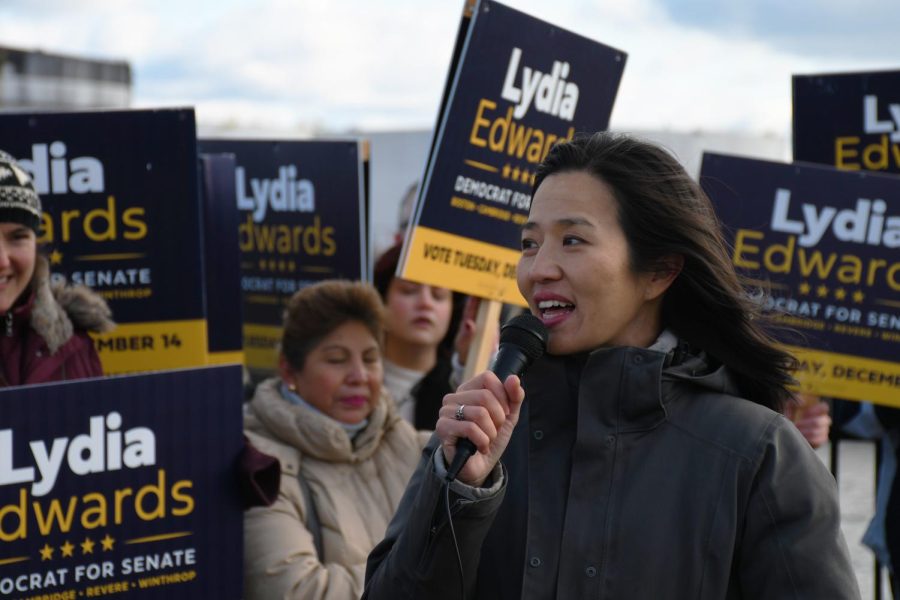Mayor Michelle Wu makes history in election win
Mayor Michelle Wu speaks Nov. 27 in support of City Councilor Lydia Edwards’ senate bid. Edwards previously endorsed Wu in the mayoral race.
December 12, 2021
The Nov. 2 Boston mayoral election was extremely historic — the candidate that was elected broke down barriers as the first Asian American woman elected to the position.
Two people became frontrunners: Michelle Wu and Annissa Essaibi George. Although former mayor Marty Walsh was technically eligible for reelection, he resigned earlier this year after being chosen as President Joe Biden’s secretary of labor, blowing the race wide open. Wu maintained a steady lead over Essaibi George in the polls weeks before election day. Earlier last month, Wu won over Essaibi George by a margin of 91,239 to 50,879.
“From every corner of our city, Boston has spoken. We are ready to meet this moment. We are ready to become a Boston for everyone,” Wu said to a crowd of supporters the night she won. “I want to be clear, it wasn’t my vision on the ballot, it was ours, together.”
Besides being a historic win for Boston, she is also a promising politician. Wu proposed sweeping and transformative legislation in her mayoral agenda, promising to address climate change, an issue pertinent to Boston, and other key problems like systemic racism. As a result, the majority of her support and endorsements came from progressive organizations, including the Working Families Party, Sunrise Movement Boston and Planned Parenthood Advocacy Fund of Massachusetts.
The problems facing Boston that Wu will have to address in office are widespread and complex, including policing issues, poverty, public education, transportation and housing.
Wu also has plans of implementing a city-level Green New Deal for Boston. This Green New Deal would ultimately aim to confront not only climate change, but also economic equality and the wealth gap. This is a very progressive plan of action that addresses numerous aspects of climate change. All of these aspects can and must be improved within the city of Boston. Wu has already signed an ordinance that requires the city of Boston to divest from fossil fuels and tobacco, as well as a private prison industry by late 2025. This just shows Wu’s tenacity and her drive to enact change quickly and efficiently within the city.
Poverty has been an epidemic in the city for years, owing to Boston’s exorbitant cost of living. One of her most prominent points during her campaign was a proposed measure called rent control, pushing back against the increasing cost of housing. She also wants to create a fare-free public transit system, which would no longer require riders to pay to get onto MBTA services. Both of these plans would lower the cost of living for Bostonians. Wu even filed an appropriations request to make three bus lines free for 2 years on her first day in office. This investment will ultimately allow for Boston to reap the benefits of a fare-free bus service and public transit system.
Wu also made it clear she wants to decrease the racial wealth gap in the city. To do this, she plans on fighting the root cause of wealth and income inequality by shifting “the rules, practices and norms that have enabled racial inequalities to persist since the city’s founding,” according to her campaign website.
In addition, Wu proposed creating a citywide plan and regional coalition to reduce homelessness and substance use disorder, both of which are major problems in the city. These components of Wu’s plans are a step in the right direction to addressing poverty in Boston.
Wu must work with other officials in Boston to actually make these propositions come true in real life. This will not be an easy feat, but she believes change is possible, which is something she has reiterated many times.
Overall, Wu displayed not only great tenacity during her mayoral campaign, but also a great sense of care for the community and city of Boston as a whole. Boston needs someone who will care about the people in the city in order to make changes that are long lasting and beneficial for all, and Wu is the right person for that job.
Alyssa Endres is a third-year political science and communication studies combined major and opinion editor of The News. She can be reached at [email protected].


















